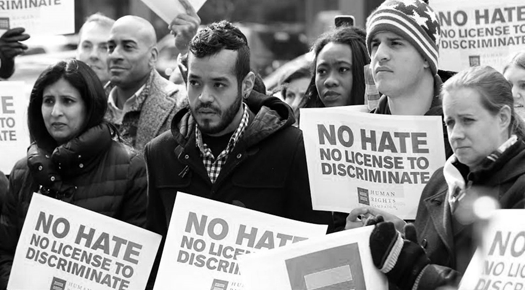
Photo Credits: Human Rights Campaign
Texas - As Texas Tribune reports, after a heated debate, the measure passed on a 19–12 initial vote with one Democrat, Sen. Eddie Lucio, voting for it — and one Republican, Sen. Kel Seliger, voting against. It requires one more vote in the Senate before it can be sent to the Texas House for debate.
Republican State Sen. Charles Perry introduced the bill and insisted that “this bill does nothing to promote any illegal or discriminatory activity.” “It’s not licensing discrimination at any level,” he said in the debate.
[Charles] Perry said the bill provides a defense for licensed professionals who find themselves before credentialing boards based on conduct or speech motivated by their “sincerely held religious beliefs” — a pre-emptive protection for religious employees at a time when, he claimed, religion is under attack.
But LGBTQ advocates and Democrats have criticized the bill as an attempt to give cover to those who would deny critical services to members of the LGBTQ community. Last week, leaders from major businesses like Amazon, Facebook and Google, as well as tourism officials from some of the state’s biggest cities, came out in force against the bill. Discriminating against LGBTQ communities is bad for business, they said.
…
“Senate Bill 17 will ensure that anyone can practice their profession in Texas without being forced to compromise their religious faith,” Patrick spokesman Alejandro Garcia said last week.
Texas LGBTQ rights advocates have called the bill a “license to discriminate.”
“[Lt. Gov.] Dan Patrick has doubled down on his attack on the LGBTQ community, moving out of bathrooms and into every single licensed profession in Texas,” said Samantha Smoot, the organization’s interim executive director. “SB 17 would create a religious litmus test, and open the doors to discrimination and to real harm to LGBTQ Texans. Dan Patrick has launched a whole new war against LGBTQ people.”
“What if somebody said, ‘I am not going to provide a service because you are a gay couple?’” asked [Sen. Kel] Seliger, an Amarillo Republican. “If somebody said, ‘You’re Muslim, I’m not going to provide this service’?… Doesn’t this bill essentially provide a defense of that discrimination or discriminatory behavior?”
In what he characterized as an effort to codify that, Sen. José Menéndez, a San Antonio Democrat, proposed an amendment to the bill that would explicitly prohibit professionals from refusing service based on gender identity or sexual orientation. Perry put it to a vote; the amendment failed 12–19.
